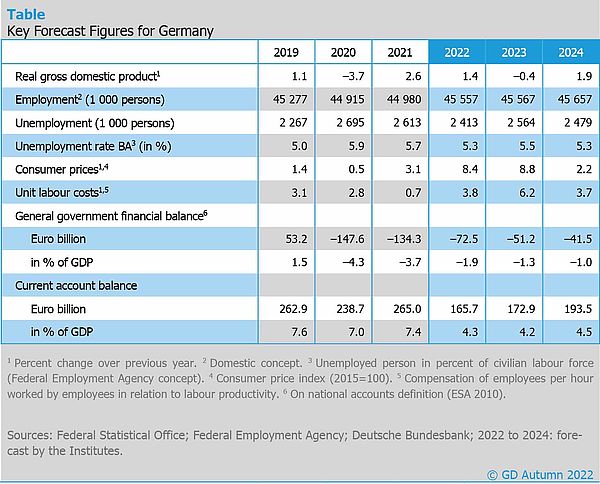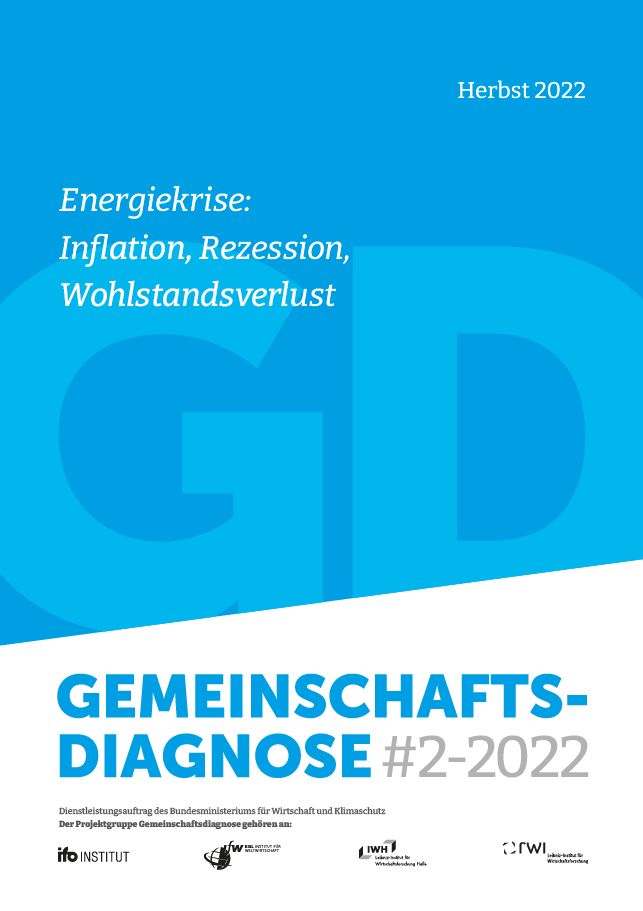Joint Economic Forecast 2/2022: Energy crisis: inflation, recession, welfare loss

For the current year, the institutes are almost halving their spring forecast. For the coming year, they are lowering their forecast from 3.1% to ‒0.4%. This revision mainly reflects the extent of the energy crisis. For example, the combined economic output in 2022 and 2023 should be EUR 160 billion lower than it had been expected in the spring. The inflation rate is expected to increase further over the coming months. The average annual inflation rate for 2023 should climb to 8.8%, slightly higher than the current year's figure of 8.4%. Only in 2024 will the 2% mark be gradually reached again.
The main reason for the deterioration in the economic outlook is the reduced gas export from Russia, which has eliminated a significant part of the gas supply and increased the risk that the remaining supply and storage volumes will not be sufficient to meet the demand during the coming winter. Against this background gas prices have skyrocketed in the summer. Businesses have already started to cut back their gas consumption noticeably. Even though the institutes do not expect any gas shortages under normal weather conditions over the winter, the supply situation remains extremely tight. Although the situation is expected to ease somewhat over the medium term, gas prices are likely to remain well above pre-crisis levels. This will mean a permanent loss of prosperity for Germany.
The labour market is having a stabilising effect. Demand for new labour is likely to decline in view of the economic downturn. However, due to the shortage of skilled workers in many areas, companies will be keen to retain existing staff, so employment is only likely to fall slightly temporarily.
"The Russian attack on Ukraine and the resulting crisis on the energy markets are leading to a noticeable slump in the German economy," says Torsten Schmidt, head of economic research at RWI – Leibniz Institute for Economic Research and spokesman for the Joint Economic Forecast Project Group. "The high energy and food prices, which are likely to rise further in the coming year, are causing significant losses in purchasing power. Both low-income households and businesses are therefore dependent on further support from policymakers. In the case of businesses, however, care must be taken to avoid permanent subsidies. At least the labour market is showing signs of stability; due to the shortage of personnel in many sectors, no increase in unemployment is expected despite the economic crisis."
The Joint Economic Forecast was prepared by the ifo Institute (Munich), the Kiel Institute for the World Economy (IfW Kiel), the Halle Institute for Economic Research (IWH), and RWI – Leibniz Institute for Economic Research (Essen).
The full report will be available on September 29, 2022 at 10:00 a.m. www.gemeinschaftsdiagnose.de/category/gutachten/.
About the Joint Economic Forecast
The Joint Economic Forecast is published twice a year on behalf of the German Federal Ministry for Economic Affairs and Climate Action. The following institutes participated in the autumn report 2022:
- ifo Institute – Leibniz Institute for Economic Research at the University of Munich in cooperation with the Austrian Institute of Economic Research (WIFO)
- Kiel Institute for the World Economy
- Halle Institute for Economic Research (IWH) – Member of the Leibniz Association
- RWI – Leibniz Institute for Economic Research in cooperation with the Institute for Advanced Studies Vienna
Scientific Contacts
Professor Dr Torsten Schmidt
RWI – Leibniz Institute for Economic Research
Phone +49 201 8149 287
Torsten.Schmidt@rwi-essen.de
Professor Dr Oliver Holtemöller
Halle Institute for Economic Research (IWH) – Member of the Leibniz Association
Phone +49 345 7753 800
Oliver.Holtemoeller@iwh-halle.de
Professor Dr Stefan Kooths
Kiel Institute for the World Economy
Phone +49 431 8814 579 or +49 30 2067 9664
Stefan.Kooths@ifw-kiel.de
Professor Dr Timo Wollmershäuser
ifo Institute – Leibniz Institute for Economic Research at the University of Munich
Phone +49 89 9224 1406
Wollmershaeuser@ifo.de
Whom to contact
For Researchers

Vice President Department Head
If you have any further questions please contact me.
+49 345 7753-800 Request per E-MailFor Journalists

Head of Public Relations
If you have any further questions please contact me.
+49 345 7753-720 Request per E-MailIWH list of experts
The IWH list of experts provides an overview of IWH research topics and the researchers and scientists in these areas. The relevant experts for the topics listed there can be reached for questions as usual through the IWH Press Office.
Related Publications

Energiekrise: Inflation, Rezession, Wohlstandsverlust
in: Dienstleistungsauftrag des Bundesministeriums für Wirtschaft und Klimaschutz, 2, 2022
Abstract
Die krisenhafte Zuspitzung auf den Gasmärkten belastet die deutsche Wirtschaft schwer. Durch die reduzierten Gaslieferungen aus Russland ist ein erheblicher Teil des Angebots weggefallen und auch das Risiko gestiegen, dass die verbleibenden Liefer- und Speichermengen im Winter nicht ausreichen, um die Nachfrage zu decken. Die Gaspreise sind in den Sommermonaten in die Höhe geschossen, und auch auf den Terminmärkten zeigen sich für einen längeren Zeitraum deutlich höhere Notierungen. Die dadurch stark steigenden Verbraucherpreise schmälern insbesondere die Kaufkraft der privaten Haushalte. Die Wirtschaftsleistung dürfte im dritten Quartal bereits leicht gesunken sein. Im Winterhalbjahr ist ein deutlicher Rückgang zu erwarten. Dass dieser nicht noch kräftiger ausfällt, ist dem hohen Auftragspolster im Verarbeitenden Gewerbe zu verdanken. Insgesamt dürfte die Produktion in diesem Jahr trotz des Rückgangs in der zweiten Jahreshälfte um 1,4% ausgeweitet werden. Damit halbieren die Institute ihre Prognose vom Frühjahr für dieses Jahr annähernd. Für das kommende Jahr ist zu erwarten, dass das Bruttoinlandsprodukt im Jahresdurchschnitt um 0,4% zurückgeht. Im Frühjahr erwarteten die Institute noch einen Anstieg von 3,1%. In dieser Revision zeigt sich das Ausmaß der Energiekrise. Im Jahr 2024 expandiert das Bruttoinlandsprodukt im Jahresdurchschnitt mit 1,9%. Die Inflationsrate dürfte sich in den kommenden Monaten weiter erhöhen. Jahresdurchschnittlich ergibt sich für das Jahr 2023 mit 8,8% eine Teuerungsrate, die leicht über dem Wert des laufenden Jahres (8,4%) liegt. Erst im Jahr 2024 wird die 2%-Marke allmählich wieder erreicht.



